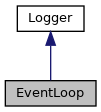Manage timers and tasks. More...
#include <eventloop.h>


Public Member Functions | |
| EventLoop (std::string log_label="MainLoop") | |
| void | addTask (Task *task, Task *parent=nullptr) |
| bool | run (double timeout_s) |
| void | runUntilComplete () |
| Run until all task are done. | |
| void | waitForThreadsToFinish () |
| Block current thread until all spawned threads have finished. | |
| void | abortTask (Task *task) |
| Remove the given task. | |
| void | abort () |
| Remove all tasks. | |
| void | getChildTasks (std::set< Task * > &tset, Task *parent) const |
| Get all tasks with the given parent. | |
| void | abortChildTasks (Task *parent) |
| Remove all tasks with the given parent. | |
| void | wakeUpTask (Task *t) |
| Restart idle connections owned by the given task. | |
| bool | wakeUpConnection (SocketConnection *s) |
| Restart an idle connection. | |
| void | cancelConnection (SocketConnection *s) |
| Remove a connection. | |
| std::set< Socket * > | findConnByTask (const Task *t) const |
| Return all connetcions owned by the given task. | |
| bool | isActive (const Socket *conn) const |
| Return true if conn still exists. | |
| void | resetTimer (Task *task, double s) |
| bool | addConnection (SocketConnection *conn) |
| bool | addConnected (SocketConnection *conn) |
| bool | addServer (ServerSocket *conn) |
| bool | tlsSetKey (ServerSocket *conn, const std::string &crt_path, const std::string &key_path, const std::string &password) |
| Use SSL certificate for a listening socket. | |
| bool | setCABundle (const std::string &path) |
| Set path to file containing chain of trust for SSL certificate. | |
| bool | running (Task *task) |
| Return true if task is running. | |
| void | taskDeleted (Task *task) |
| Notify EventLoop that a task object it ows has been deleted. More... | |
| void | spawnThread (Task *task, const std::string &name="ThreadLoop", std::ostream *log_file=nullptr, Task *parent=nullptr) |
| Create a new thread and run task in its own loop in that thread. | |
| int | externalCommand (Task *owner, const char *const argv[]) |
| WorkerProcess * | createWorker (Task *parent, std::ostream *log_file, unsigned int channels, unsigned int wno) |
| WorkerProcess * | createWorker (Task *parent, const std::string &log_file_name, unsigned int channels, unsigned int wno) |
| void | killChildProcesses (int signum) |
| Send signal to all child processes. | |
| void | notifyTaskFinished (Task *task) |
| Mark the given task as finished. More... | |
| void | notifyTaskMessage (Task *task) |
| Notify the EventLoop that the given task has a message to deliver. More... | |
| bool | aborted () const |
| Return true if the EventLoop is about to be terminated. | |
| void | addSignalHandler (int signum, void(*handler)(int, EventLoop &)) |
| Add handler for the given OS signal. | |
| bool | startObserving (Task *from, Task *to) |
| bool | isObserving (Task *observer, Task *task) const |
| Return true if observer is observing task. | |
 Public Member Functions inherited from Logger Public Member Functions inherited from Logger | |
| Logger (std::string label) | |
| std::string | label () const |
| Return the object's log label. | |
| void | resetLabel (const std::string &new_label) |
| Modify the object's log label. | |
Static Public Member Functions | |
| static void | runTask (Task *task, const std::string &name="MainLoop", std::ostream *log_file=nullptr, EventLoop *parent=nullptr) |
| static void | interrupt () |
| static void | daemonize () |
| Fork into background, detach from shell. | |
| static void | setLogFilename (const std::string &filename) |
| Set path to log file. More... | |
 Static Public Member Functions inherited from Logger Static Public Member Functions inherited from Logger | |
| static void | setLogFile (std::ostream &stream) |
| Set global log destination. More... | |
| static void | reopenLogFile (const std::string &filename) |
| If current log is a file (ofstream), reopen it with new filename: | |
| static void | setLogLimit (unsigned int loglines=0, unsigned int warnlines=0, unsigned int errlines=0) |
| Set max number of lines of info/warn/err log. More... | |
| static void | sayTime (std::ostream &stream) |
| Write current local time to the given stream. | |
| static bool | inError () |
| Return true if any error has been logged (globally since start) | |
| static std::ostream & | err_log (const std::string &label) |
| Write a line of error log. More... | |
| static std::ostream & | warn_log (const std::string &label) |
| Write a line of warning log. More... | |
| static std::ostream & | log (const std::string &label) |
| Write a line of info log. More... | |
| static void | flushLogFile () |
| static void | pauseLogging () |
| Disable all log output until next call to Logger::setLogFile. | |
| static double | secondsSince (const TimePoint &t) |
| static double | secondsTo (const TimePoint &t) |
| static int64_t | msSince (const TimePoint &t) |
| static int64_t | msTo (const TimePoint &t) |
| static bool | hasExpired (const TimePoint &t) |
| Return true if current time is after the given TimePoint. | |
| static TimePoint | timeNow () |
| Return current time. | |
| static TimePoint | timeAfter (double s) |
| Return current time plus s seconds. | |
| static TimePoint | timeMax () |
| Return a very distant time. | |
| static std::chrono::microseconds | toUs (double t) |
| Convert s (seconds) to std::chrono::microseconds. | |
| static std::string | dateString (time_t t=0) |
| Return local time, formatted as 2023-10-14T09:38:47+0200. | |
| static std::string | dateString2 (time_t t=0) |
| Return local time, formatted as Sat, 14 Oct 2023 09:38:47. | |
| static std::string | createHashKey (unsigned int length=20) |
| Return a random string. More... | |
Additional Inherited Members | |
 Protected Member Functions inherited from Logger Protected Member Functions inherited from Logger | |
| std::ostream & | errno_log () const |
| Write a line of error log after a failed system call has set the global errno to a non-zero value. More... | |
| std::ostream & | err_log () const |
| Write a line of error log. More... | |
| std::ostream & | warn_log () const |
| Write a line of warning log. More... | |
| std::ostream & | log () const |
| Write a line of info log. More... | |
| std::ostream & | dbg_log () const |
| Write a line of debug log. More... | |
Detailed Description
Manage timers and tasks.
This class manages Task objects and their timers. It also manages all network connections through an Engine object. The Engine is an "inner event loop" used to manage low-level network events.
Your code must create an EventLoop object, add one or more Task objects to it, and then run the event loop, either "forever" using the method EventLoop::runUntilComplete() or by regularly calling the method EventLoop::run(double timeout_s)
Constructor & Destructor Documentation
◆ EventLoop()
|
inline |
Member Function Documentation
◆ addConnected()
| bool EventLoop::addConnected | ( | SocketConnection * | conn | ) |
Use this if conn contains a socket that has already been connected. Returns false (and deletes conn) on failure. On success, returns true and calls connAdded on owner task, then calls connected() on conn to get initial state.
◆ addConnection()
| bool EventLoop::addConnection | ( | SocketConnection * | conn | ) |
Create a new socket connection, and add it to the loop. Returns false (and deletes conn) on failure. On success, returns true and calls connAdded on owner task. A connection to the server will be initiated. When connected, the connected() method will be called on conn to get initial state.
◆ addServer()
| bool EventLoop::addServer | ( | ServerSocket * | conn | ) |
Returns false (and deletes conn) on failure. On success, returns true and calls serverAdded on owner task.
◆ addTask()
Add a task to be managed by the EventLoop. The value of the task parameter must be an object of a subclass of Task. You must create the object with new; it cannot be an object on the stack. The EventLoop will take ownership of the object and will delete it when the task has finished. Before it is deleted, the parent's taskFinished method will be called unless the parent is nullptr.
◆ createWorker() [1/2]
| WorkerProcess * EventLoop::createWorker | ( | Task * | parent, |
| const std::string & | log_file_name, | ||
| unsigned int | channels, | ||
| unsigned int | wno | ||
| ) |
Create a child process. Return child's PID. Channels can be used to pass sockets and messages between parent and child.
◆ createWorker() [2/2]
| WorkerProcess * EventLoop::createWorker | ( | Task * | parent, |
| std::ostream * | log_file, | ||
| unsigned int | channels, | ||
| unsigned int | wno | ||
| ) |
Create a child process. Return child's PID. Channels can be used to pass sockets and messages between parent and child.
◆ externalCommand()
| int EventLoop::externalCommand | ( | Task * | owner, |
| const char *const | argv[] | ||
| ) |
Asynchronously execute an external command. Return false on immediate failure.
◆ interrupt()
|
inlinestatic |
Call this to make the network engine yield control to me (the task supervisor).
◆ notifyTaskFinished()
|
inline |
Mark the given task as finished.
Don't call this method directly. Use Task::setResult instead.
◆ notifyTaskMessage()
|
inline |
Notify the EventLoop that the given task has a message to deliver.
Don't call this method directly. Use Task::setMessage instead.
◆ resetTimer()
| void EventLoop::resetTimer | ( | Task * | task, |
| double | s | ||
| ) |
Remove previous timer, run after s seconds instead. If s = 0, run timer immediately. If s < 0, remove timer.
◆ run()
| bool EventLoop::run | ( | double | timeout_s | ) |
Run for at most timeout_s seconds. Returns false if all done, otherwise true:
◆ runTask()
◆ setLogFilename()
|
inlinestatic |
Set path to log file.
The new log file will be activated upon receiving the SIGHUP signal.
◆ startObserving()
Enable events from task "from" to task "to". I.e. "from" will be able to call executeHandler with "to" as a parameter. If "to" dies before "from", "from" will be notified through a call to taskFinished. Will return false unless both tasks still exist.
◆ taskDeleted()
| void EventLoop::taskDeleted | ( | Task * | task | ) |
The documentation for this class was generated from the following files:
- src/framework/eventloop.h
- src/framework/eventloop.cpp